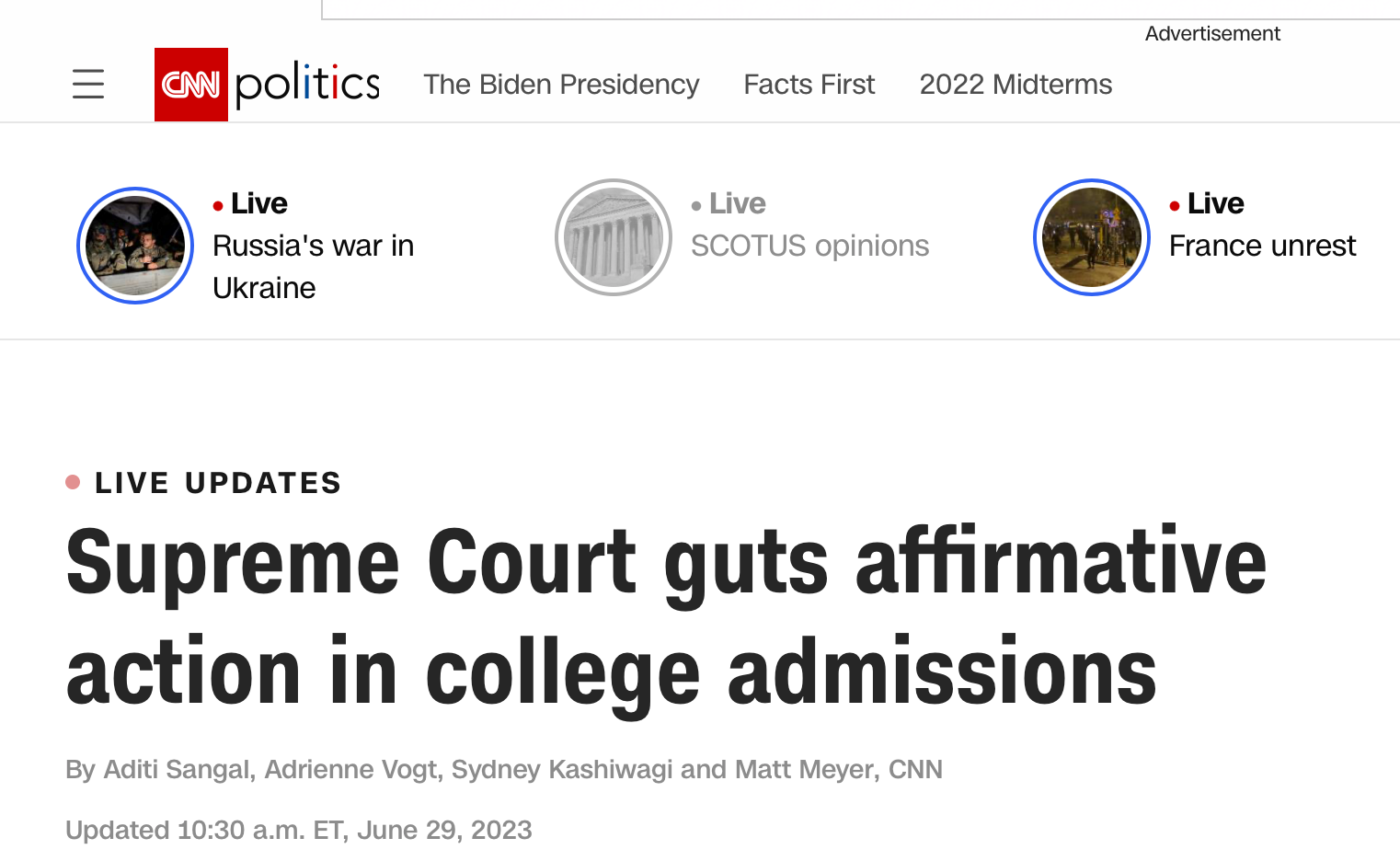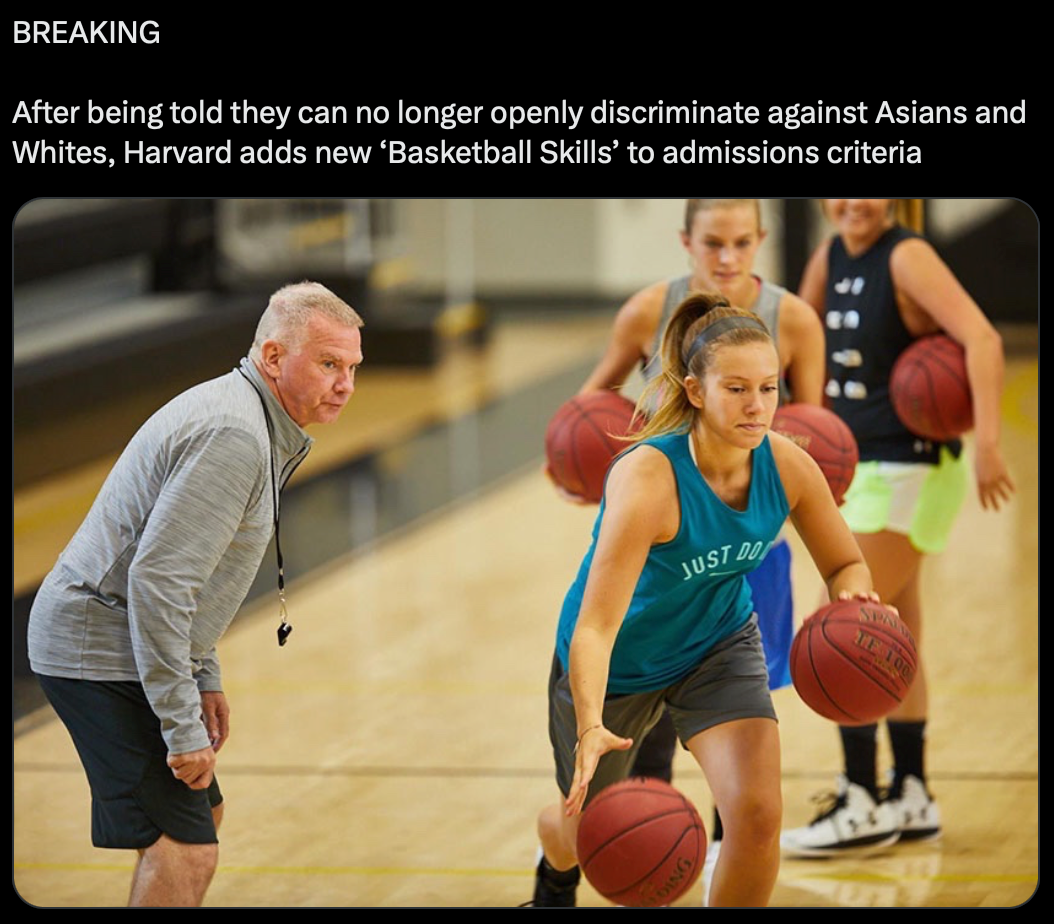SCOTUS on Harvard and UNC
-
https://supremecourt.gov/opinions/22pdf/20-1199_hgdj.pdf
"Harvard’s and UNC’s admissions programs violate the Equal Protection Clause of the Fourteenth Amendment."
Interesting that it was 6-3.
-
“The student must be treated based on his or her experiences as an individual—not on the basis of race,” Roberts wrote. “Many universities have for too long done just the opposite. And in doing so, they have concluded, wrongly, that the touchstone of an individual’s identity is not challenges bested, skills built, or lessons learned but the color of their skin. Our constitutional history does not tolerate that choice.”
-
What's funny is the term "Affirmative Action" is actually defined in many places to be exactly what the SCOTUS just ruled. Such as:
Department of Labor: Affirmative action is defined by OFCCP regulations as the obligation on the part of the contractor to take action to ensure that applicants are employed, and employees are treated during employment, without regard to their race, color, religion, sex, sexual orientation, gender identity, national origin, disability, or ...
Then again, take a look at the contradicting definition from places like Cornell:
Affirmative action is defined as a set of procedures designed to; eliminate unlawful discrimination among applicants, remedy the results of such prior discrimination, and prevent such discrimination in the future.
Got that? It's supposed to:
- Eliminate discrimination
- But also discriminate to correct the past
- But also not discriminate, so as to prevent it in the future
-
I read Kavanaugh's opinion, in which he stressed the respect he had for the dissenters. Then I read Jackson's opinion, in which this gem of a sentence appears:
Because the majority’s judgment stunts that progress without any basis in law, history, logic, or justice, I dissent.
Again, culture matters. And the total contempt lefties have for their opposition, permeates to our highest court, now. It's actually sad.
-
“The student must be treated based on his or her experiences as an individual—not on the basis of race,” Roberts wrote. “Many universities have for too long done just the opposite. And in doing so, they have concluded, wrongly, that the touchstone of an individual’s identity is not challenges bested, skills built, or lessons learned but the color of their skin. Our constitutional history does not tolerate that choice.”
@George-K said in SCOTUS on Harvard and UNC:
“The student must be treated based on his or her experiences as an individual—not on the basis of race,” Roberts wrote. “Many universities have for too long done just the opposite. And in doing so, they have concluded, wrongly, that the touchstone of an individual’s identity is not challenges bested, skills built, or lessons learned but the color of their skin. Our constitutional history does not tolerate that choice.”
But in practice, it can be simple for an admissions office to still weight in favor of preferred minorities, citing the struggles that the community endures and the student has had to overcome indicates a strength of character that is highly valued by the institution.
What does the ruling actually accomplish? I’m not sure that it accomplishes more than just getting rid of the verbiage. The DEI Offices will still make sure that it’s weighted towards preferred minorities.
-
@George-K said in SCOTUS on Harvard and UNC:
“The student must be treated based on his or her experiences as an individual—not on the basis of race,” Roberts wrote. “Many universities have for too long done just the opposite. And in doing so, they have concluded, wrongly, that the touchstone of an individual’s identity is not challenges bested, skills built, or lessons learned but the color of their skin. Our constitutional history does not tolerate that choice.”
But in practice, it can be simple for an admissions office to still weight in favor of preferred minorities, citing the struggles that the community endures and the student has had to overcome indicates a strength of character that is highly valued by the institution.
What does the ruling actually accomplish? I’m not sure that it accomplishes more than just getting rid of the verbiage. The DEI Offices will still make sure that it’s weighted towards preferred minorities.
@LuFins-Dad said in SCOTUS on Harvard and UNC:
@George-K said in SCOTUS on Harvard and UNC:
“The student must be treated based on his or her experiences as an individual—not on the basis of race,” Roberts wrote. “Many universities have for too long done just the opposite. And in doing so, they have concluded, wrongly, that the touchstone of an individual’s identity is not challenges bested, skills built, or lessons learned but the color of their skin. Our constitutional history does not tolerate that choice.”
But in practice, it can be simple for an admissions office to still weight in favor of preferred minorities, citing the struggles that the community endures and the student has had to overcome indicates a strength of character that is highly valued by the institution.
What does the ruling actually accomplish? I’m not sure that it accomplishes more than just getting rid of the verbiage. The DEI Offices will still make sure that it’s weighted towards preferred minorities.
They can just go by economic class, which few people have an issue with, and which would favor black people even more than they currently are. This ruling is more of a principle thing, than a practical effect thing.
-
Haven't read the ruling yet, but I suspect I will agree with it.
I would also rather the universities/colleges give admission preferences by socioeconomic factors rather than by racial factors.
@Axtremus said in SCOTUS on Harvard and UNC:
Haven't read the ruling yet, but I suspect I will agree with it.
I would also rather the universities/colleges give admission preferences by socioeconomic factors rather than by racial factors.
Yep. I haven’t posted here yet because we all knew this was coming and talked about it at length after orals.
I’m excited to see and hear about the opinions in the coming days.


